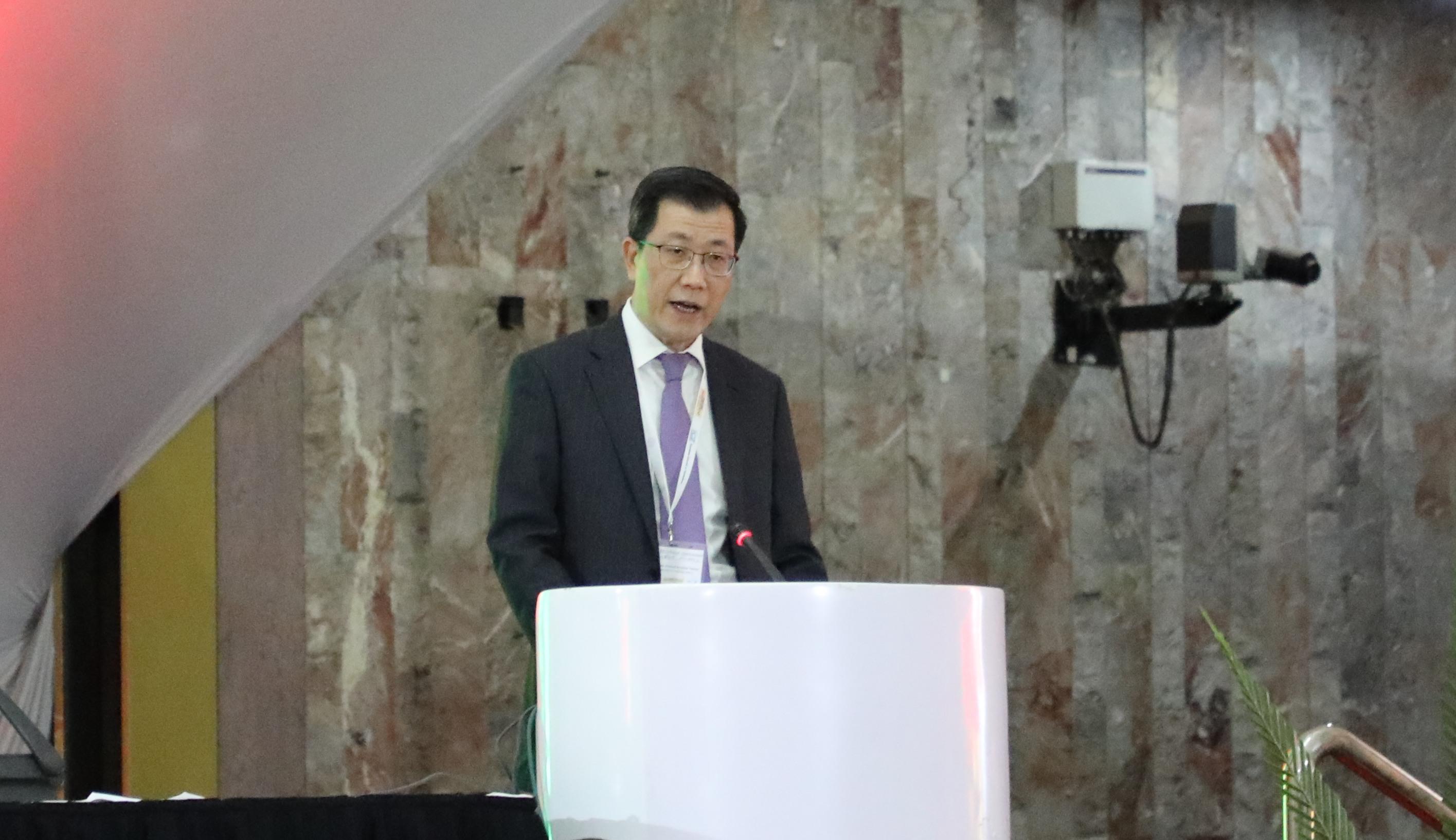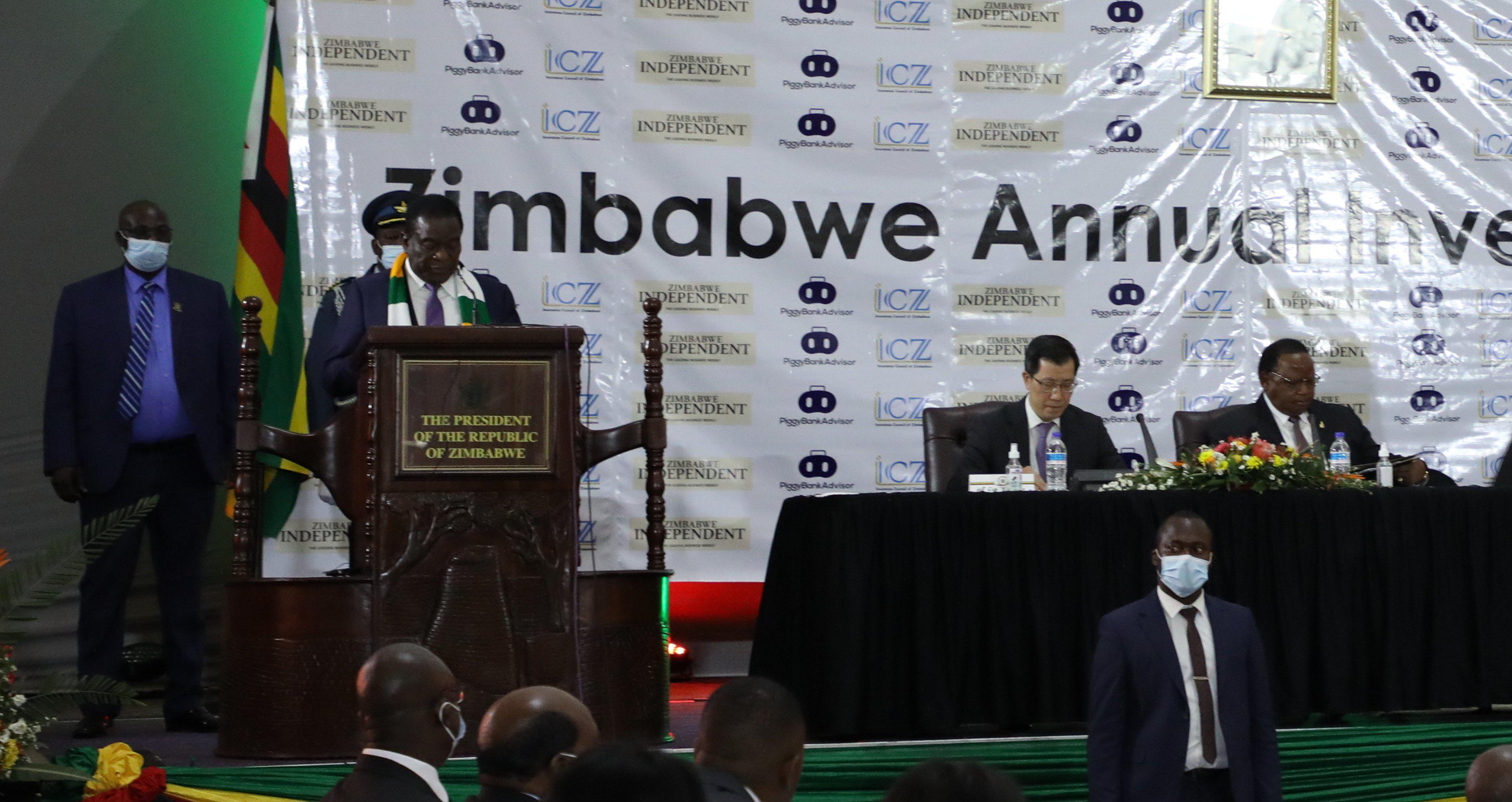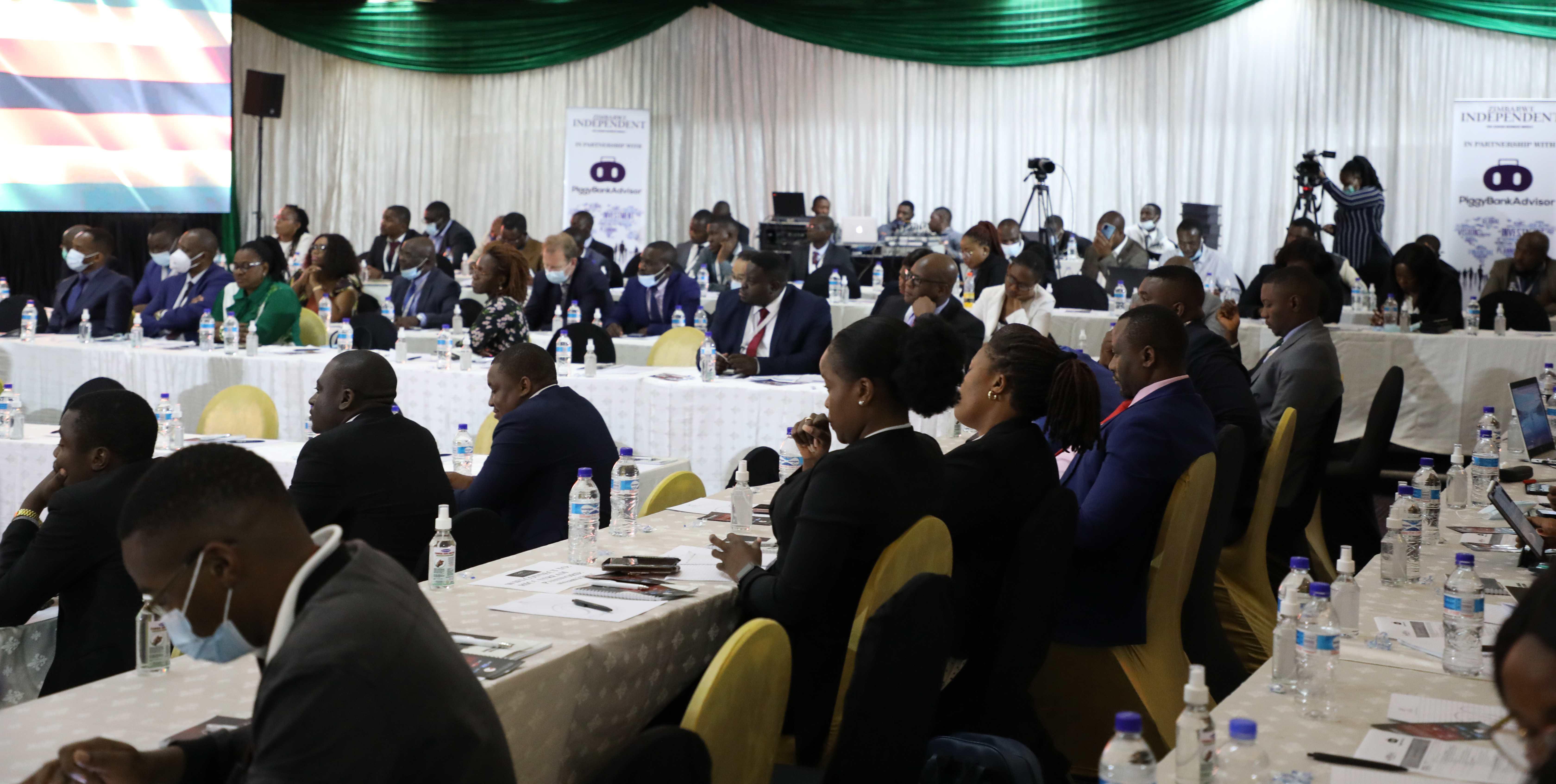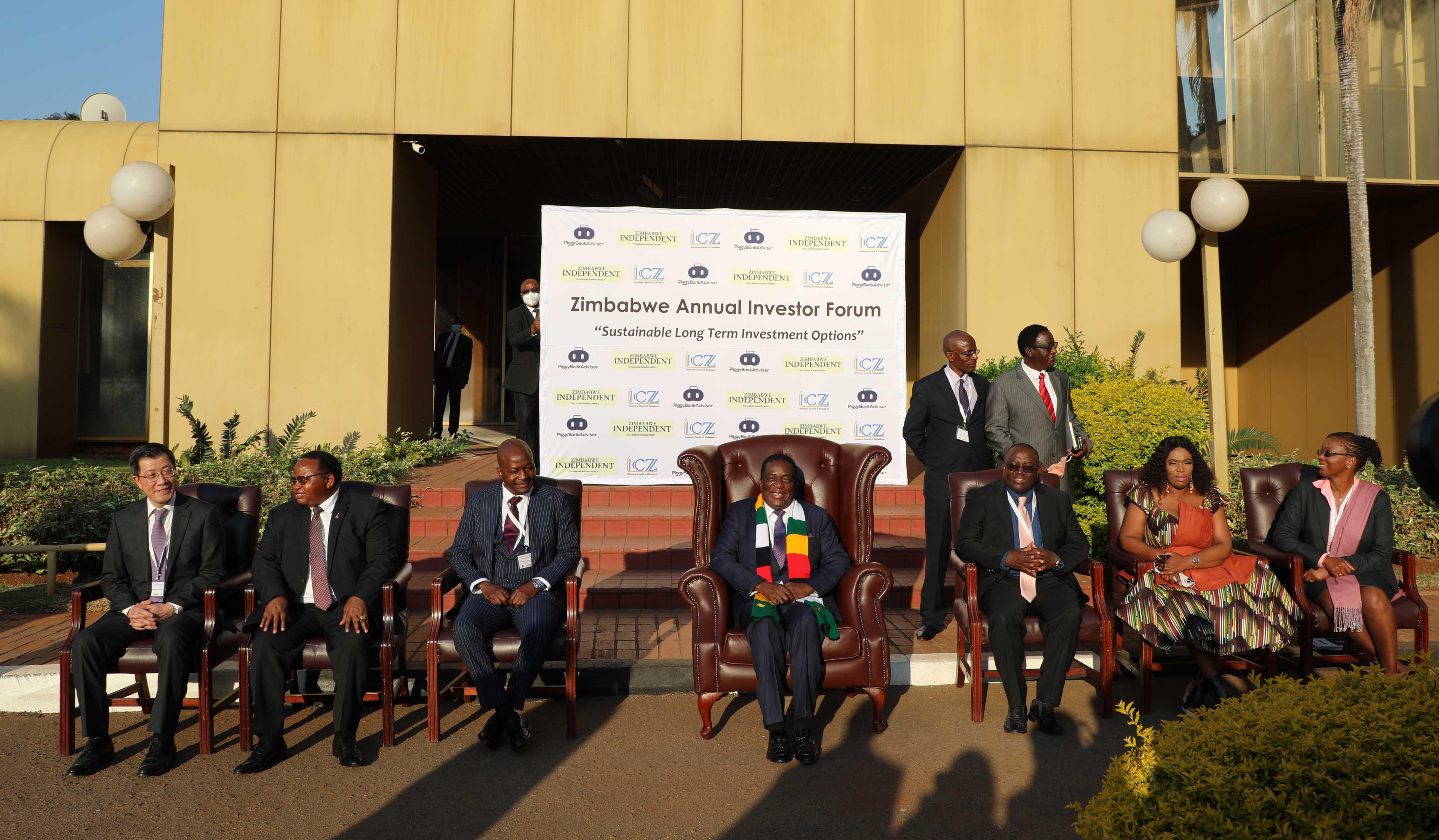On 24th August, Chinese Ambassador to Zimbabwe H.E. Guo Shaochun was invited to the Inaugural Zimbabwe Annual Investor Forum and gave a speech on "The Logic of China-Zimbabwe Cooperation". The full text of the speech is as follows:

“His Excellency President E.D. Mnangagwa,
Honorable Ministers,
Ladies and Gentlemen,
It is my great pleasure to attend the Zimbabwe Annual Investment Forum and I would like to start by thanking the organizers for their gracious invitation.
“Sustainable” is the key word of the theme of today’s forum and is highly consistent with the logic and practice of China-Zimbabwe cooperation. I would like to take this opportunity to share my opinions about "the Logic of China-Zimbabwe Cooperation".
As the Chinese Ambassador to Zimbabwe, I have always been asked by Zimbabwean friends, "Why would China like to support Zimbabwe even though the two countries are geographically far away from each other?"
History and reality can give the best answer. China and Zimbabwe have always been partners with a shared future in weal and woe. We have both suffered from imperialism and colonialism for a long time; both struggled hard for independence, liberation and prosperity of our own countries. Shared experiences, historic mission and common ideals have brought us close together.
In the past 42 years, following the principles of sincerity, real results, affinity and good faith and with concrete actions, China has been supporting Zimbabwe to realize its national development, overcome the negative impacts of illegal sanctions and stay interacting with the global economy. Under the strategic guidance of President Xi Jinping and President Mnangagwa, China and Zimbabwe have enjoyed ever-growing excellent relations and sound bilateral cooperation across the board.
On intergovernmental cooperation, by providing various assistance and support, China has been helping Zimbabwe improve its infrastructures which are urgently needed for promoting economic development and people's livelihood. The well-known National Pharmaceutical Warehouse, the 1,000 Borehole Project, the New Parliament Building, donation of 12 million doses of Covid-19 vaccines, the High-Performance Computing Center and Chinese Medical Team, are all implemented with China aid.
The Kariba South Hydro Power Station Expansion, Hwange Thermal Power Station Expansion, Victoria Falls International Airport Upgrading, Expansion and Upgrading of the Robert Gabriel Mugabe International Airport and NetOne broadband construction, are supported by China's concessional loans.
The Protocol of Phytosanitary Requirements for Export of Zimbabwean Fresh Citrus to China signed last year is one of the policy supports by China in promoting export of Zimbabwe’s agricultural products. It aims to establish “green lanes” for Zimbabwean agricultural products into the Chinese market, marking a breakthrough of China’s policy supports in helping Zimbabwe’s economic development.
We encourage more well-established and capable Chinese companies to invest in Zimbabwe. We are glad to see that the Chinese private investments are becoming the vital forces to promote Zimbabwe’s economy. The construction of Dinson Iron and Steel Company invested by China’s Tsingshan Corporation is well on track. Through open bidding on the international market, some Chinese large enterprises have invested in local lithium mines and are revitalizing the resources that were long idled by western companies. Many Chinese enterprises have also invested in other sectors such as tobacco planting and export, crop farming, building materials manufacturing, and freight logistics. These investments introduce Zimbabwe’s high-quality products into international markets, bring Zimbabwe considerable forex earnings and tax revenues, tens of thousands of job opportunities and technology transfers and promote Zimbabwe’s competitiveness in the global economy.
With the concerted efforts of the governments and enterprises, the trade between China and Zimbabwe has kept growing. In the first half of this year, the bilateral trade volume reached US$973 million with an increase of 57%, of which China imported US$504 million from Zimbabwe and exported US$469 million to Zimbabwe, up 103% and 26% respectively. In view of the global economic disruption caused by the Covid-19 pandemic, this is a great achievement which is significant to maintain Zimbabwe’s economic vitality.

Ladies and Gentlemen,
"How is the sustainability of China-Zimbabwe cooperation?” This might be an issue that you would care about and is also closely related to the theme of this forum.
Over the years, China has been working closely with Africa, exploring a distinctive new path to win-win cooperation in the new era and forming the China-Africa cooperation pattern which is unique, welcomed by Africa and stands the test of history. The sustainability of China-Africa cooperation could be summarized in three aspects.
First, it focuses on development. Since the beginning of the 21st century, China has actively supported Africa's economic development and provided Africa with new financing channels to help Africa build capacity for self-generated development. As Africa's reliable partner, China always respects the wishes of the African people. Our financing to Africa mainly focuses on infrastructure and manufacturing-related sectors so as to meet the region's real needs.
To date, by putting various funds to use, Chinese companies have helped African countries build and upgrade over 10,000 kilometers of railway, around 100,000 kilometers of highway, around 1,000 bridges and 100 ports and many large-scale power plants, hospitals and schools. Such financing support has boosted economic growth, increased tax revenues, created jobs and improved people's lives in African countries including Zimbabwe, bringing tangible benefits to African people.
The China-financed projects currently under construction in Zimbabwe covering electricity generation, airports and communication facilities are all focusing on areas most in need of development. We hope other countries, especially those with capabilities, could do more to help improve Zimbabwe's infrastructure.
Second, it adheres to recipient-driven approaches and the principles of openness and transparency. Frankly speaking, there are some wrong arguments against China-Africa financing cooperation, the most absurd of which is the so-called “Chinese debt trap”.
Following their political independence, African countries have made tireless efforts toward national development and economic revitalization. In this process, a shortage of funds for development and the need for external financing are problems that African countries have to face. Therefore, Africa's debt situation is in nature an issue of development, so is Zimbabwe's debt situation. The solution lies in ensuring the effective use of funds and loans and increasing capacity for self-generated development. However, instead of truly helping Africa promote economic growth, generate more tax revenues, and increase exports and earn forex for improved balance of payments, some financing from Western countries mainly focus on non-manufacturing sectors, and even come with political strings attached such as political reforms in receiving countries. Such financing can easily end up as unpayable bad loans. This is the real "debt trap".
Based on such logic, China has been carrying out cooperation with Zimbabwe by focusing on the real and urgent needs of Zimbabwe. It is always Zimbabwe to make decisions on what and whether to build. China never decides anything for Zimbabwe. The grants and financial supports by China always follow the principles of openness and transparency. Every project is in the open without anything to hide. It’s always easy to find out where the funds are used and what benefits are generated. This is the best transparency.
In its cooperation with Africa, China stays committed to the principles of equality and mutual benefits and respects the independent choices of African countries. China never attaches political strings or economic coercive requirements to its assistance to Africa, never exports its ideologies or values to Africa, never forces African countries to use their natural resources as collateral in exchange for grants or loans. Not a single African country slid into domestic political unrest or economic distress just because of its cooperation with China.
As long as being managed and operated well, the China-financed projects in Zimbabwe could generate sustained returns for Zimbabwe that far outweigh the input, serve as long-term support for Zimbabwe's economy and benefit Zimbabwean people for generations. This is the most undisputed sustainability.
I would like to call on the international community to truly benefit Africa when providing financial support. The financial support for Africa should adhere to the nature of assistance and not only to seek commercial returns. According to the estimates of the UK's Debt Justice based on World Bank data, the interest rates of China's official and commercial loans to African countries are lower than the interest rate (of 5%) on commercial loans from other countries. They are also far lower than the interest rates (of 4-10%) on the 10-year government bonds, according to the numbers disclosed by the African Development Bank. Besides, the sovereign loans provided by China come with a fixed interest rate, while Western commercial creditors usually apply fluctuating interest rates. As the US dollar enters its rate hike cycle, the debtor countries are facing growing pressure on repayment.
To put it simply, the so-called "Chinese debt trap" is a lie made up by some Western countries and politicians to deflect responsibility and blame. What African people should stay alert to and try their biggest efforts to shake off is the "trap of underdevelopment" and the "trap of intervention in internal affairs by external forces".
I would also like to reiterate that the Chinese Government has consistently required Chinese enterprises to abide by the laws and policies of host countries, protect the environment, respect labor rights, take their social responsibilities and accept supervision of the Zimbabwean authorities and public scrutiny. We firmly support Zimbabwean Government in continuously refining the regulatory framework to enhance the supervision on all foreign investments and create a more favorable investment climate.
Third, it stays open and inclusive. Supporting Africa's development is the common responsibility of the international community. We welcome greater interest and input towards Africa from the international community. There should be no exclusive competition or "zero-sum" game in supporting Africa's development. China also values the trilateral cooperation in Africa. For example, nearly two million Zimbabweans, especially women and children, were given access to medical and health care services under a joint initiative between China and UNICEF that the Chinese government sponsors through its South-South Cooperation Assistance Fund. China welcomes more and more countries to become sincere development partners of Zimbabwe, but we are firmly opposed to any practice that meddles in Zimbabwe's internal affairs and tramples on Zimbabwe's sovereignty in the name of "assistance", forcing Zimbabwe to accept unequal cooperation by sanctions or other coercive measures.
Under the leadership of H.E. President Mnangagwa, and with the tireless efforts of Zimbabwean people, we believe that more fruitful results will be achieved through the "Open For Business" policy, the investment environment will surely be improved, and more investments by well-established foreign enterprises, including Chinese enterprises, will come to Zimbabwe. All of these will provide a strong impetus to Zimbabwe's economy.

Ladies and Gentlemen,
In 2021, President Xi Jinping proposed the Global Development Initiative and Africa is the first continent to collectively welcome and support the initiative. This demonstrates our determination to strengthen solidarity and coordination and promote equity and justice under the new circumstances. Last year, the “nine programs” of China-Africa cooperation were adopted during the 8th Ministerial Conference of the Forum on China-Africa Cooperation (FOCAC). During the Coordinators' Meeting on the Implementation of the Follow-up Actions concluded last week, China and Africa coordinated the approach to cooperation, identified priority areas and projects, and made steady and solid progress in implementing the “nine programs”.
Looking into the coming years, the handover of the New Parliament Building, National Pharmaceutical Warehouse and 500 boreholes will soon be witnessed. We are also seeing good progress in the Hwange thermal power station expansion and Netone Phase III project. 10 million doses of China-aid Covid-19 vaccines will arrive in Zimbabwe this year. We are going to welcome another batch of Chinese Agricultural Experts to Zimbabwe and continue to build agricultural demonstration villages. More China-aid projects including another 300 boreholes, PhaseⅡof High-Performance Computing Center and Anti-Narcotics Laboratory will be commissioned. Zimbabwean citrus will appear in the Chinese market. Bilateral cooperation on clean energy and e-commerce will be discussed. More Zimbabwean students will go to study in China. More great Chinese companies will come to invest.
The issue of "sustainability" is both simple and complex. But no matter what dimension is used for research, discussion and evaluation, FACTS and RESULTS should always be put first, because only FACTS and RESULTS are the truest and can truly stand the test of history and time.
Thank you!”

This forum is organized by the Independent in partnership with PiggyBank Advisor under the theme of “Sustainable Long Term Investment Opportunities”. H.E President E.D. Mnangagwa delivered keynote address at the Forum. Nearly 300 people attended this event, including Hon. F. Shava, Minister of Foreign Affairs and International Trade, other senior officials from the Zimbabwean government and representatives from the business society.